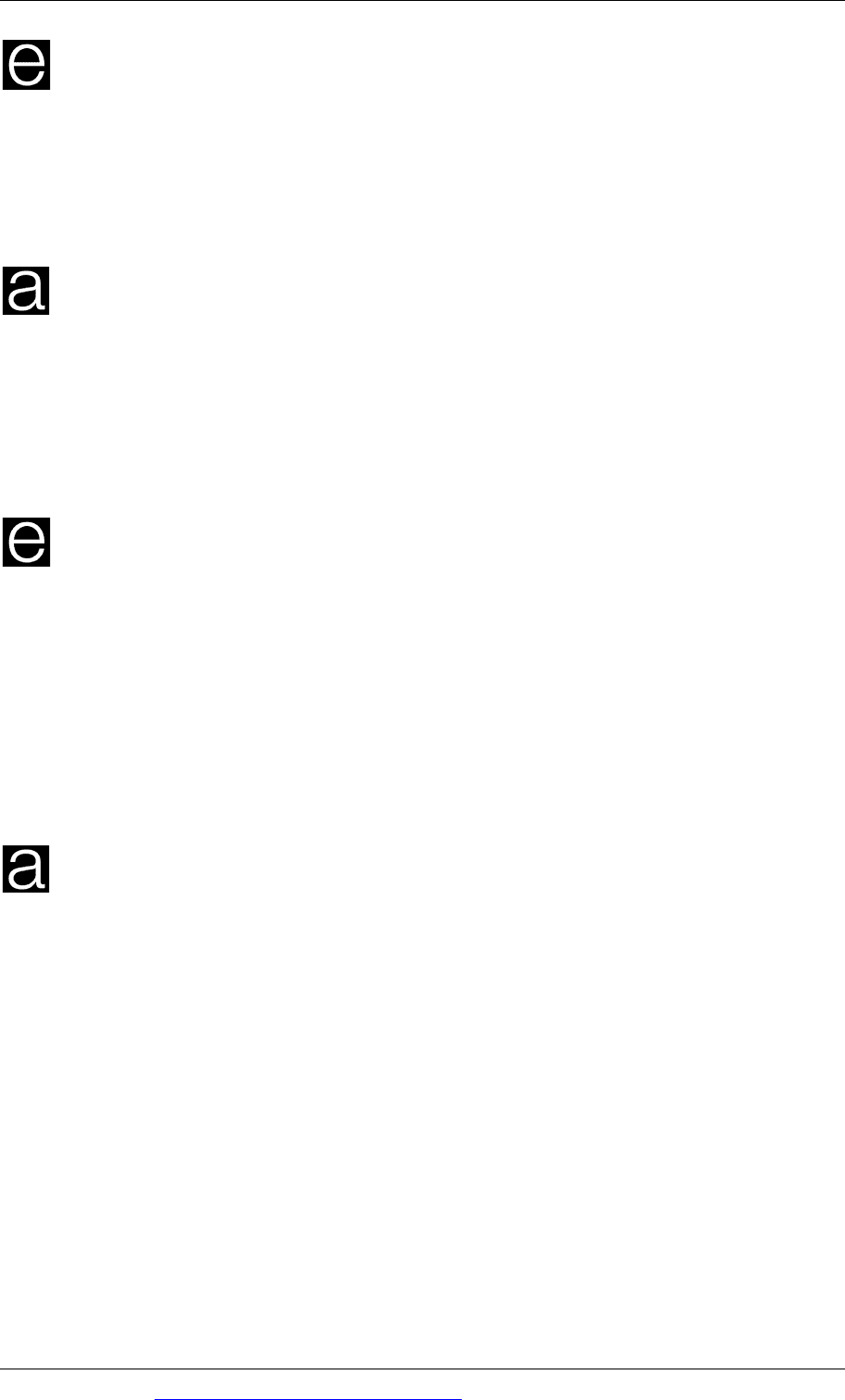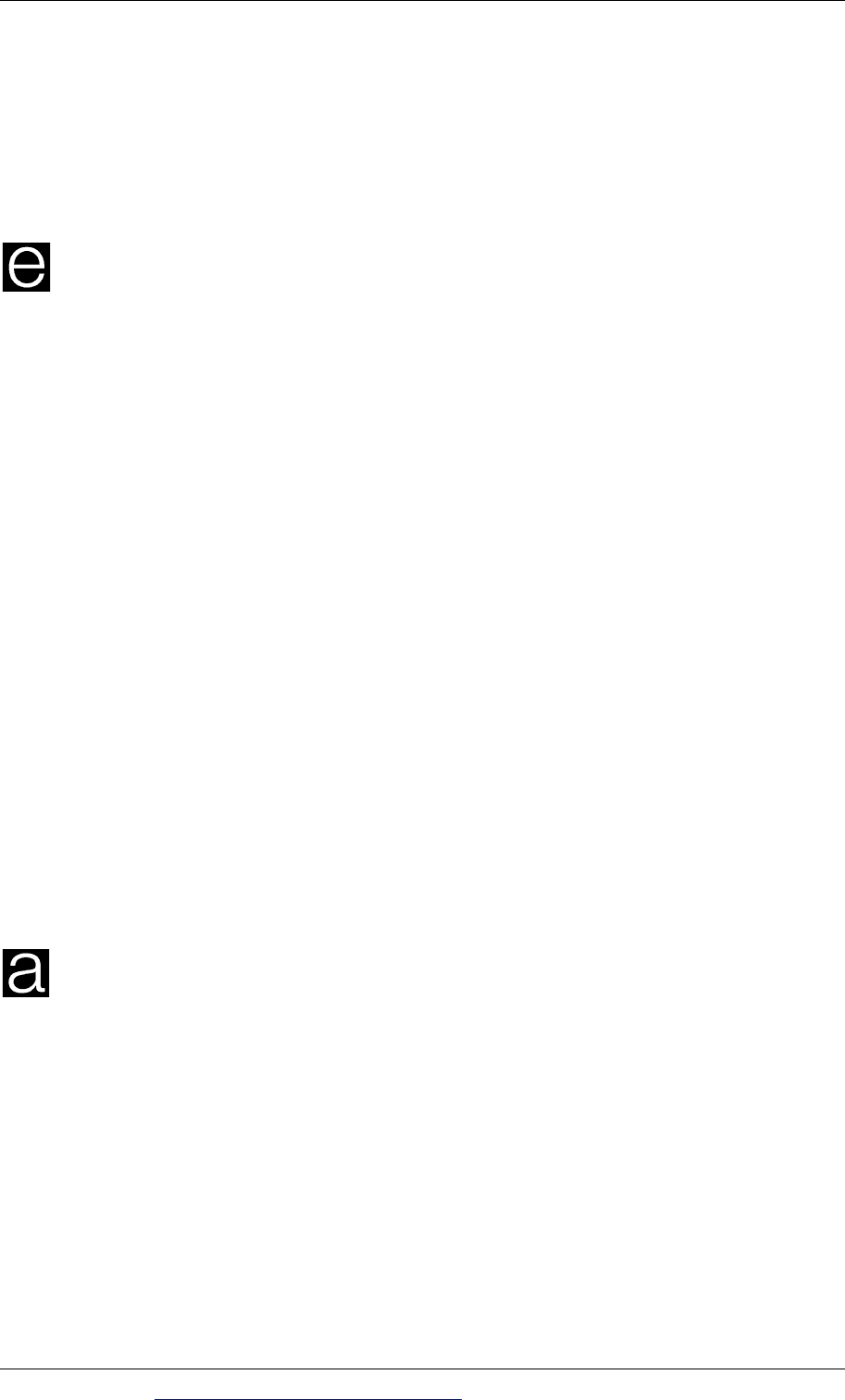ACCA P1 Governance, Risk and Ethics - 2010 - Study text - Emile Woolf Publishing
Подождите немного. Документ загружается.


Chapter 15: Conflicts of interest and ethical conflict resolution
© EWP Go to www.emilewoolfpublishing.com for Q/As, Notes & Study Guides 315
Answer
The IFAC Code and ACCA Code are specific on this point. If an accountant has a
loan from a client (or employer) the financial interest could in some cases create a
conflict of interest.
However, if the loan from the bank has been provided on normal commercial
terms, no conflict of interest exists. There is no ethical reason preventing you from
working on the Big Bank audit.
1.3 The nature of ethical safeguards
When there are threats to compliance with the fundamental ethical principles, the
accountant should assess the safeguards against the threat.
There might already be safeguards in place that eliminate the possibility that the
risk will ever materialise, or that reduce the risk to an acceptable level.
If the safeguards that exist are not sufficient, the accountant should try to
introduce new safeguards to eliminate or reduce the risk to an insignificant level.
Ethical safeguards can be grouped into two broad categories:
safeguards created externally, by legislation, regulation or the accountancy
profession
safeguards established within the work environment.
Safeguards created by legislation, regulation or the accountancy profession
Safeguards that are created externally, by legislation, regulation or the profession,
include the following.
The requirements for individuals to have education and training and work
experience, as a pre-condition for membership of the professional body.
The continuing professional development (CPD) requirements for qualified
members, to ensure that they maintain a suitable level of competence.
Corporate governance regulations, particularly those relating to auditing,
financial reporting and internal control.
Professional standards, such as financial reporting standards and auditing
standards.
Monitoring procedures and disciplinary procedures.
External review by a legally-empowered third party.
Safeguards in the work environment
A variety of safeguards can be applied within the work environment. These can be
categorised into:
safeguards that apply across the entire firm or company, and
safeguards that are specific to a particular item of work.

Paper P1: Professional accountant
316 Go to www.emilewoolfpublishing.com for Q/As, Notes & Study Guides © EWP
Safeguards that apply across the entire firm or company might include the
following:
a code of ethics for the company or firm and suitable ethical leadership from
senior management
a sound system of internal control, with strong internal controls
the application of appropriate policies and procedures for monitoring the quality
of work done for clients
policies that limit the reliance of the firm on the fee income from a single client
procedures for identifying personal interests and family relationships between
employees and partners of the firm and key staff in client organisations
whistle blowing procedures for reporting illegal or unethical behaviour.
Safeguards that might be applied to particular jobs or work procedures include the
following:
keeping individuals away from work where there might be a threat to their
compliance with the fundamental principles (for example where a conflict of
interests or a conflict of familiarity might exist)
in the case of audit firms, rotating the audit partner so that the same audit
partner is not responsible for the audit of the same client company for more than
a specified maximum number of years
the application of strong internal controls
using another accountant to review the work that has been done by a colleague
discussing ethical issues with those people in the company who are responsible
for governance issues, such as the audit committee, senior non-executive
director, or board of directors.
Example
A member of the audit team working on the audit of ABC Company has just
received an inheritance that includes a large number of ABC Company shares.
What is the ethical risk and what safeguards against the risk might be appropriate?
Answer
The risk is that the member of the audit team has a financial interest in the client,
by owning a large number of the client company shares. There is a potential
conflict of interest, which will threaten his or her integrity.
Suitable safeguards would be either:
to persuade the individual to sell the shares, or
to remove the individual from the audit of ABC Company.

Chapter 15: Conflicts of interest and ethical conflict resolution
© EWP Go to www.emilewoolfpublishing.com for Q/As, Notes & Study Guides 317
Example
A senior partner in an accountancy firm is also a director of XYZ Company. XYZ
Company has approached the audit firm, and asked it to become the company’s
auditors.
What is the ethical risk and what safeguards against the risk might be appropriate?
Answer
The risk is that the senior partner has a financial interest in the client company, and
presumably also has a familiarity risk.
The IFAC Code and ACCA Code state that in this situation, there are no
safeguards that are strong enough to reduce the threat from the conflict of interest
to an insignificant level. The firm must refuse to take on the audit work.
Example
You are an accountant working in public practice. You are approached by a
subsidiary company of a foreign parent company. This company would like you to
provide a number of professional services. The parent company is based in a
country where you have no professional contacts. The ethical risks in taking on a
new client were described in a previous example.
Required
What are the safeguards against the risk that should reduce the risk to an
acceptable, insignificant level?
Answer
A key safeguard is to obtain information that verifies the ownership of the parent
company and shows who has ultimate control over the group, including the UK
subsidiary.
Before accepting the UK subsidiary as a client, enquiries should be made in the
country of the parent company. The enquiry might be made through an ACCA
member in that country, or an ACCA member might be asked to recommend a local
lawyer who could do the work.
You would want to receive certified copies of original documentation relating to the
structure of the parent company, evidence of its registration as a company
(including the details registered on its incorporation), a list of the members of its
board of directors and any other information about the company that is available to
the public in that country.
If you are satisfied with the information you receive, you should feel able to take on
the subsidiary company as a client. If you are not satisfied, and are unable to obtain

Paper P1: Professional accountant
318 Go to www.emilewoolfpublishing.com for Q/As, Notes & Study Guides © EWP
any other information that provides the safeguards you are looking for, you should
inform the company that you are not able to provide the services that the company
requires.
1.4 Threats to accountants in business
You should be aware that accountants who work in business can be placed under
serious pressure by an employer to act in an unethical way. A problem could arise
when senior management want to ‘bend the rules’ in financial reporting and expect
compliance from their accounting staff. Accountants might therefore be asked to:
break a law or regulation: illegal activity is always unethical
ignore technical standards, such as financial reporting standards or auditing
standards
lie to the external auditors or regulators
issue a report that is misleading and misrepresents the facts.
When an accountant is put under pressure to act in this way, the threat comes from:
self-interest threats: by doing what senior management expect, the accountant
might expect to benefit from personal rewards, such as a bonus, a higher salary
or promotion
intimidation threats: there might also be a threat from senior management that
the accountant might not receive a bonus or might be expected to resign unless
he agrees to do what senior management ask
familiarity threats: in some cases, an accountant might be expected to agree to
what senior management ask because he has known them for a long time and
should be expected to trust them to do ‘what is right’ for the company.
However, threats of this nature are very serious. Breaking a law, ignoring a
technical standard, hiding information from the auditors or lying to them and
providing misleading information could all have serious consequences. There is a
threat to the accountant’s compliance with the fundamental principles of:
integrity
objectivity
professional competence and due care
professional behaviour.
Finding a solution to ethical problems can be very difficult. The extreme option (or
‘nuclear option’) is resignation, but this is something that should be avoided where
possible. A better solution can often be found.
A model for dealing with ethical problems is suggested in the next section.

Chapter 15: Conflicts of interest and ethical conflict resolution
© EWP Go to www.emilewoolfpublishing.com for Q/As, Notes & Study Guides 319
A model for resolving ethical conflicts
A model based on threats and safeguards
The mirror test
Applying the model in practice
2 A model for resolving ethical conflicts
2.1 A model based on threats and safeguards
The ACCA has suggested a model for dealing with ethical dilemmas, and using
judgement to decide how the dilemma should be resolved. It is based on
recognising threats to compliance with the fundamental principles, and assessing
safeguards to eliminate the threats.
The model is in several logical stages, as follows.
Stage 1. Recognise and define the ethical issues.
Stage 2. Identify the threats to compliance.
Stage 3. Assess the significance of the threats.
Stage 4. If the threats are ‘not insignificant’, consider the additional safeguards
that could be used.
Stage 5. Re-assess the threats to compliance after additional safeguards. Do the
additional safeguards eliminate the risk or reduce it to an insignificant level?
Stage 6. Make the decision about what to do.
Define the issues
Accountants are expected to identify potential threats to their compliance with the
fundamental ethical principles. To do this, they must be able to recognise the ethical
issues that exist, or might possibly exist, in a particular situation. The first step is
therefore to define the issues.
In order to do this, it might be necessary to establish the facts. An accountant might
suspect that an ethical issue exists, but cannot be sure because he does not have
enough facts to inform him about the situation.
In addition, the accountant should ask whether he has considered all the possible
alternative courses of action, and whether there are any courses of action that avoid
the threats.
Yet another question the accountant should ask is whether the problem is his, or
whether it is the problem of someone else. An accountant does not have a duty to
take on the ethical responsibilities of another person. He must consider his own
actions, and whether these are ethical and acceptable.

Paper P1: Professional accountant
320 Go to www.emilewoolfpublishing.com for Q/As, Notes & Study Guides © EWP
Identify the threats to compliance with ethical principles
Having established the facts and defined the ethical issues, the accountant must next
think about his own involvement. The concern for the accountant should be
whether his compliance with the fundamental ethical principles is under threat, and
if so, what is the nature of the threat.
Is there a self-interest threat, a self-review threat, an advocacy threat, a
familiarity threat or a threat from intimidation?
How does this threaten the accountant’s ability to comply with the requirements
for integrity, objectivity, professional competence and due care, confidentiality
and professional behaviour?
Assess the significance of the threats
The next stage is to identify the significance of the threats to compliance with the
fundamental ethical principles. If existing controls are sufficient to eliminate the risk
of non-compliance, or if the existing controls are sufficient to reduce the risk to an
insignificant level, no further action is needed.
If the threats to compliance with fundamental ethical principals are higher than
insignificant, additional safeguards should be considered in order to eliminate or
reduce the threats.
Introducing safeguards
Safeguards, or additional safeguards, can be introduced to reduce the threats to
compliance with the fundamental ethical principles. These threats must be
eliminated entirely or reduced to an insignificant level.
Taking action
Introducing additional safeguards might be sufficient to deal with the problem.
However, if the threats to compliance with the fundamental ethical principals
cannot be eliminated or reduced to an insignificant level, more extreme measures
are necessary.
For accountants in public practice, an extreme measure is to decline to work for a
particular client, or to cease working for a client.
For accountants working in industry and commerce, an extreme measure would
be to become a ‘whistleblower‘, and to report concerns to an appropriate
authority. In an extreme case, the appropriate action might be for the accountant
to resign from his or her job.
Members of the ACCA are able to obtain confidential advice about the appropriate
course of action from the Advisory Services Section of the ACCA.

Chapter 15: Conflicts of interest and ethical conflict resolution
© EWP Go to www.emilewoolfpublishing.com for Q/As, Notes & Study Guides 321
2.2 The mirror test
The ACCA has also suggested that when an ethical issue is involved, an accountant
should carry out a mirror test.
To carry out a mirror test, you have to answer a basic question about the ethics of a
course of action. If you choose a course of action, are you able to look yourself in the
mirror and see a person who has acted in a moral and ethical way. Can you justify
the decision you have taken from an ethical perspective?
Three questions that you can ask when carrying out the mirror test are as follows.
For the course of action you have chosen, the three questions are:
1 Is it legal? If it is not legal, you should not be doing it.
2 What will other people think? Think about the opinion of people whose views
matter to you, such as close family members (a parent, spouse, or close friend)
or the media. Are you satisfied with the effect of your action on these people?
3 Even if the action is legal, it is ethically correct? A problem for accountants is
often that an action is legal (or not illegal) but is nevertheless unethical and
should be avoided.
2.3 Applying the model in practice
You need to be able to identify ethical problems that could face an accountant, and
suggest a way of resolving the problem in a way that is consistent with ethical
principles. The model described above provides a useful framework for doing this.
Remember that the aim should be to find a sensible solution to each ethical problem.
The solution can often be reached through agreement with other people, and
through discussions. It is not always necessary to opt for an extreme solution, such
as reporting a problem to an external authority, resigning from a job or declining to
work for a client.
Here are a few examples to show how the model might be applied.
Example
Until recently you were a senior accountant working for the state hospital service
and you have now left to work for a company that is applying to take over some
aspects of the treatment of patients with eye problems. Until now this work has been
performed by specialist state-owned hospitals. The government has a policy of
transferring a considerable proportion of medical services to private sector
companies, and it wants to transfer the responsibility for eye treatment to the private
sector.
Your new employer has asked you to lead a team that will make the company’s
application to the government. Your boss is aware that when you were working for
the state hospital service, you worked closely with the management responsible for

Paper P1: Professional accountant
322 Go to www.emilewoolfpublishing.com for Q/As, Notes & Study Guides © EWP
the eye hospitals and you are familiar with many of the senior figures in both
hospital management and the government department responsible for public
health. From your experience in your previous job, you know a lot about the reasons
why the government wants to transfer this work from the state-owned hospitals to a
private sector company.
Your company pays large bonuses to employees in teams that successfully apply to
take over work from hospitals in the state sector.
Required
Consider whether you are faced with an ethical problem, and if so how it might be
resolved.
Answer
Step 1
The first step is to identify the ethical issue. You are being asked to lead a team that
will apply to provide medical services for the government. The reason why you
have been selected is probably your knowledge and experience of the medical
services for eye patients, and your familiarity with senior managers in the hospitals
and government department.
Step 2
Consider the threat that this creates for your compliance with the fundamental
ethical principles.
In this case, there is a threat to the ethical requirement to respect the confidentiality
of information obtained from a previous employer. You should not use confidential
information obtained in a previous job for the benefit of a new employer.
On the other hand, you have an ethical duty to assist your new employer in
achieving its legitimate business aims.
Step 3
You need to consider the significance of the threat to your compliance with the
fundamental principles.
The significance of the threat will depend on how much confidential information
you would use in carrying out the work for your employer. If there is no threat to
confidentiality, there is no problem. However in this case it seems likely that you
would inevitably be using information that you acquired when you worked for
your previous employer, and this information should be treated as confidential.
Step 4
You should therefore consider safeguards to the ethical threat and find a solution to
your problem.
The first step should be to discuss your ethical problem with your boss. If your
employer is sympathetic to ethical issues your boss is likely to agree that you should

Chapter 15: Conflicts of interest and ethical conflict resolution
© EWP Go to www.emilewoolfpublishing.com for Q/As, Notes & Study Guides 323
not be asked to lead the team that applies to do the work. Another colleague should
be appointed to lead the team on this occasion.
However, you might agree to be involved with the team, on work where you can
use your experience and knowledge where there is no threat to confidentiality. If
this is possible, you will be working to promote the legitimate interests of your
employer without any threat to your compliance with the fundamental principles.
Example
You are an accountant working for a medium-sized public company. You report to
the chief accountant, who is preparing the annual accounts.
You have been involved in preparing valuations for inventory, and you have
identified a substantial amount of slow-moving inventory that, in your opinion, is
should be written down in value, or even written off altogether.
The chief accountant has called you in for a meeting. He thanks you for the work
you have done, and comments that he is hoping that you can expect to earn a bonus
at the year end when the financial statements are approved and published. He then
adds that before he discusses the accounts with the finance director and the
auditors, he thinks that there is a problem with the write-down of the inventory. He
thinks that it would be premature to write down the inventory this year, and he
does not want to create a problem by drawing the matter to the attention of the
auditors.
He goes on to say that he thinks the matter is important, but he is sure that you will
shown good professional judgement by agreeing with his point of view, and that
you will alter the figures for inventory valuation in your report. He hints that if you
do not agree with his request, he will have to reconsider his recommendation to the
finance director about your annual bonus and that he will find it difficult in the
future to work with you on a constructive professional basis.
How should you deal with this situation?
Answer
Step 1
The first step here is to identify the issue. First, the valuation of inventory is your
problem, because you have prepared a report on the subject and you are being
asked to reconsider your professional opinion.
You might think that your initial opinion about the inventory valuation is too
cautious. It would therefore be appropriate to ask for time to re-assess your
valuation. However, this should not be an excuse for accepting the opinion of the
chief accountant. You should re-assess your valuation objectively. There might be
more up-to-date information that will help with your re-assessment.

Paper P1: Professional accountant
324 Go to www.emilewoolfpublishing.com for Q/As, Notes & Study Guides © EWP
Step 2
If you consider that there is an ethical problem, you need to identify the nature of
the threats and assess show serious they are.
There is a conflict of interest (self-interest) threat, because a suggestion has been
put to you that your annual bonus depends on your willingness to accept the
views of the chief accountant. There is also an intimidation threat, in the sense
that your future career might be affected by hostility from the chief accountant.
You might also think that there is pressure to accept the view of the chief
accountant, because you are familiar with him and are willing to accept his
opinion.
These create threats to your integrity, if you believe that your assessment of the
inventory valuation is correct. There are also threats to your objectivity and to
the requirement for you to act with professional competence and due care.
Step 3
The next step is to assess how serious the threats are. The scale of the threat might
depend to some extent on the significance of the write-down in inventory, and the
effect this would have o n the reported profits for the year. A minor difference
might be overlooked, but anything more serious should not be ignored.
Step 4
You need to consider safeguards to protect yourself against the ethical threat. As an
initial course of action, after you have re-assessed the inventory valuation, should
be able to discuss your concerns to the chief accountant. If the chief accountant has
not changed his opinion, you can ask for some time to think about what you should
do.
If you disagree with the chief accountant and you consider the problem to be
serious, it would be inappropriate for you to decide that it is no longer your
problem and you will simply do what you are told.
It would also be inappropriate to decide that you can wait and see what the auditors
have to say about inventory valuation. This is shifting the responsibility to the
auditors, when the responsibility is initially yours. You cannot be sure that the
auditors will identify the problem during the course of their audit.
Safeguards to the ethical threats you are facing can possibly be obtained by
informing other people within the company to the nature of the problem. You can
consider arranging a meeting with the finance director or the chairman of the audit
committee to discuss your concerns.
If you find that the finance director or audit committee are not willing to listen to
your views, you might consider informing the auditors about your concern.
However, before you do this you might wish to ask the ACCA for confidential
advice on the matter.
If these measures fail to remove your concerns about the ethical risk, you might
need to consider resignation from the company.
